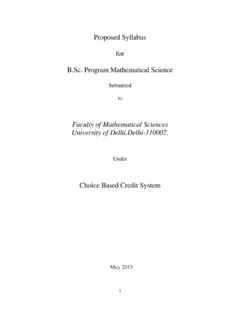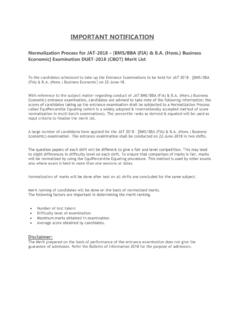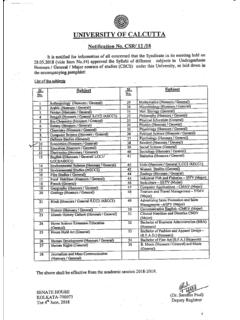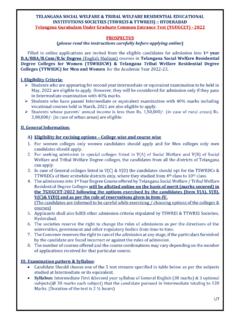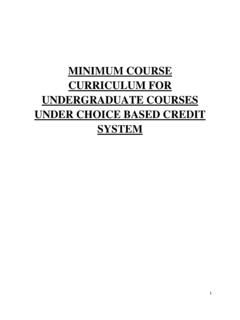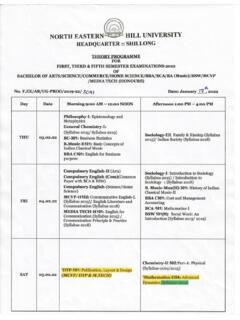Transcription of DEPARTMENT OF POLITICAL SCIENCE UNIVERSITY OF DELHI
1 1 ( honours ) POLITICAL SCIENCE (Three Year Full Time Programme) COURSE CONTENTS (Effective from the Academic Year 2011-2012 onwards) DEPARTMENT OF POLITICAL SCIENCE UNIVERSITY OF DELHI DELHI - 110007 2 Course: (Hons.) POLITICAL SCIENCE Semester I Paper I: Colonialism in India Paper II: Understanding POLITICAL Theory Paper III: Constitutional Democracy and Govt. in India Paper IV: Concurrent Qualifying Language Semester II Paper V: Nationalism in India Paper VI: POLITICAL Theory: Concepts and Debates Paper VII: POLITICAL Processes in India Paper VIII: Concurrent Credit Language Semester III Paper IX: Introduction to comparative govt.
2 And Politics Paper X: Theories of Administration Paper XI: Theories of International Relations and World History Paper XII: Concurrent Interdisciplinary Semester IV Paper XIII: POLITICAL Institutions and Processes in Comparative Perspective Paper XIV: Public Policy and Administration in India Paper XV: Global Politics Paper XVI: Concurrent Discipline Centered I Semester V Paper XVII: Indian POLITICAL Thought-I Paper XVIII: Classical POLITICAL Philosophy Paper XIX: Development Process and Social Movements in Contemporary India Paper XX: One optional from the following: A.
3 Understanding South-Asia B. The African Experience: Polity and Economy C. Feminism Theory and Practices D. Dilemmas in Politics E. Public Policy in India 3 Semester VI Paper XXI: Indian POLITICAL Thought-II Paper XXII: Modern POLITICAL Philosophy Paper XXIII: India s Foreign Policy Paper XXIV: One optional from the following: A. Contemporary POLITICAL Economy B. Feminism and Indian Politics C. The United Nations and Global Conflicts D. State Institutions and Civil Society Organisations in India Paper XXV: Concurrent Discipline Centered II 4 SEMESTER BASED UNDER-GRADUATE honours COURSES Distribution of Marks & Teaching Hours The Semester-wise distribution of papers for the ( honours ), ( honours ), B.
4 Com., ( honours ) statistics and ( honours ) Computer SCIENCE will be as follows: Type of Paper Max. Marks Theory Exam. Teaching per week Main Papers 100 75 25 5 Lectures 1 Tutorial Concurrent Courses 100 75 25 4 Lectures 1 Tutorial Credit Courses for (Hons.) Mathematics 100 75 25 4 Lectures 1 Tutorial Size of the Tutorial Group will be in accordance with the existing norms.
5 The existing syllabi of all Concurrent/Credit Courses shall remain unchanged. The existing criteria for opting for the Concurrent /Credit Courses shall also remain unchanged. 5 SEMESTER 1 Paper I Colonialism in India Course Objective: The purpose of this course is to help the students understand India s colonial past. The importance and relevance of understanding this past is the fact that the roots of many POLITICAL institutions and ideas, social and economic structures that are central to politics in India today can be traced back to this past.
6 The course seeks to achieve this understanding by studying colonialism in India from different perspectives that reveal different facets of colonialism in India: social-economic, POLITICAL , religious, legal, and educational. I. Imperialism and colonialism (12 Lectures) 1. Brief History: Global and Indian 2. Main Perspectives on Colonialism: i. Liberalism ii. Marxism iii. Post-colonialism II. Foundations of Colonial Rule in India (10 Lectures) 1. Consolidation of British power: Police and Civil Administration 2.
7 Legal Foundations of the Colonial State: Issues related to the sovereignty and relations with British Parliament and major constitutional developments III. Economy and Society (12 Lectures) 1. Impact on Agriculture, land relations and ecology 2. Deindustrialization Debate IV. Religion and Society (12 Lectures) Ideology of Indian Improvement/ civilizing mission : Orientalists and the Anglicists (Utilitarians and Missionaries) 2. Shaping Communities: Census and Enumeration 3.
8 Colonialism and the Gender question V. Education (6 Lectures) 1. Teaching the Colonial Subject: Education 2. The New Middle Class VI. Early Indian Responses (8 Lectures) 1. Peasant and Tribal Uprisings 2. The 1857 Rebellion Essential Readings I. Imperialism and colonialism Fulcher, J. (2004) Capitalism: A Very Short Introduction. Oxford: Oxford UNIVERSITY Press. Datta, G. Sobhanlal. (2007) Imperialism and Colonialism: Towards a Postcolonial Understanding , in Dasgupta, Jyoti Bhusan (ed.)
9 SCIENCE , Technology, Imperialism and War. New DELHI : Centre for Studies in Civilization Publication and DK, pp 423-466. 6 Metcalf, T. (1995) Liberalism and Empire in Metcalf, Thomas. Ideologies of the Raj. Cambridge: Cambridge UNIVERSITY Press, Young, R. (2003) Postcolonialism : A Very short introduction. Oxford: Oxford UNIVERSITY Press, pp. 9-68. II. Foundations of Colonial Rule in India Bandopadhyay, S. (2004) From Plassey to Partition: A History of Modern India. New DELHI : Orient Longman, pp.
10 37-65 ; 75-82. Metcalf and Metcalf. (2002) A Concise History of India. Cambridge: Cambridge UNIVERSITY Press, pp. 55-80. III. Economy and Society Bandopadhyay, S. (2004) From Plassey to Partition: A History of Modern India. New DELHI : Orient Longman, ; 122-138 . Sarkar, S. (1983) Modern India (1885-1847). New DELHI : Macmillan. Chandra, B. (1999) Essays on Colonialism. Hyderabad: Orient Longman Ltd, pp. 58-78. Guha, R. and Gadgil, m. (1989) State Forestry and Social Conflict in British India , in Guha, R.



